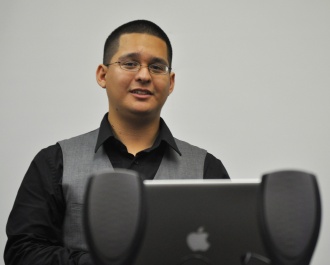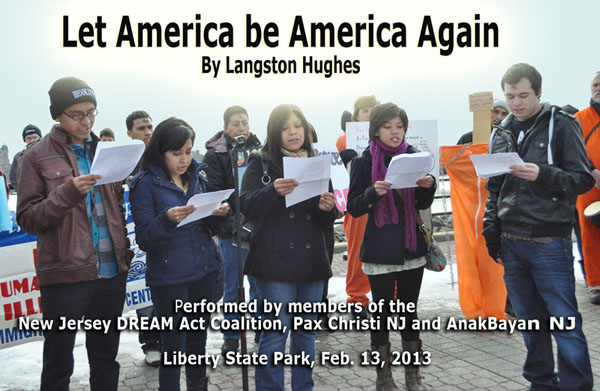Jersey City endorses in-state tuition for undocumented students
Leave a commentMarch 8, 2013 by Noel Pangilinan

DREAMers celebrate after the Jersey City Council approved the resolution supporting the bill allowing lower tuition and financial aid for undocumented youth. Photo by VERA PARRA, courtesy of AnakBayan NJ
By NOEL PANGILINAN
JERSEY City became the first local government in New Jersey last week to endorse two measures that would allow undocumented youth to avail of in-state tuition and qualify for financial aid.
On Feb. 27, Jersey City’s Municipal Council voted unanimously to pass a resolution urging state legislators to approve the Tuition Equity bills. The resolution was co-sponsored by Jersey City Councilman Rolando Lavarro and by Councilwoman Nidia Lopez.
About two dozen students — some of them wearing caps and gowns – belonging to various organizations led by the New Jersey DREAM Act Coalition (NJDAC) and supported by church leaders, advocates and community members marched to the municipal hall and attended the council meeting. They stayed on until the end of the session that lasted six hours.

Jersey City Council Member Rolando Lavarro. Photo by NOEL PANGILINAN
“Jersey City is a city of immigrants, and these are our children,” said Lavarro, the son of Filipino immigrants who settled in Jersey City in the late 1960s.
“They have worked hard, earned good grades, and dreamed big dreams. Many of them have known no other home. All they want is the opportunity to continue their education, and give back to their state of New Jersey,” he said.
For her part, Lopez, who came to the U.S. from Puerto Rico in the mid-1950s, urged the council to support the DREAMers. “I am honored to help throw open the doors of higher education and allow our young people to better themselves and, in turn, better all of the people of Jersey City,” she said.
Bea Sabino, chairperson of AnakBayan NJ, one of the organizations that campaigned for the passage of the Municipal Council resolution, said her group lauds the decision of the Jersey City Council.

Bea Sabino of AnakBayan NJ. Photo by NOEL PANGILINAN
“This is a proud moment for Jersey City,” Sabino, who came the U.S. when she was 15 six years ago, said. “Jersey City owes its rich diversity and revitalizing economy to immigrants. We’re glad that the City Council recognized that fact.”
The resolution calls for Jersey City’s local government to support the Tuition Equity for DREAMers bills and urges the New Jersey state legislature to pass A1659/S2355 and A3509/S2479.
A1659/S2355 would allow almost all New Jersey high school graduates access to in-state tuition rates, regardless of immigration status.
A3509/S2479 calls for in-state tuition rates plus access to state financial aid in New Jersey’s public colleges and universities for anyone with a high school diploma or GED certification from an educational institution in the state regardless of immigration status.

Giancarlo Tello of New Jersey DREAM Act Coalition. Photo by NOEL PANGILINAN
Giancarlo Tello, an officer of NJDAC, said the Jersey City council’s action is expected to create a snowball effect. “Other cities, inspired by Jersey City, are already considering passing their own city resolution and I look forward to the result,” said Tello, who came from Peru to the U.S. when he was six.
The term DREAMer refers to undocumented immigrant youth who stand to benefit from a proposed legislation known as the DREAM Act (acronym for Development, Relief, and Education for Alien Minors) that has been languishing in both Houses of the U.S. Congress since it was first introduced in 2001.
In-state tuition refers to the practice of universities and colleges to provide lower tuition rates and state education grants to students who are residents of that state.
In most U.S. states, undocumented youth who are unable to provide proof of their legal stay in the country are not eligible for in-state tuition and financial aid. As a result, the undocumented have no choice but to pay prohibitive out-of-state tuition to attend public colleges and universities, despite their long-term residency in the United States.
As an example, Rutgers University, the state university of New Jersey, charges an annual tuition of $13,073 for in-state students. Out-of-state students pay $26,393 a year.
Currently, only 13 states allow undocumented students to pay in-state tuition, according to the National Immigration Law Center. These are California, Connecticut, Illinois, Kansas, Maryland, Nebraska, New Mexico, New York, Oklahoma, Texas, Utah, Washington and Rhode Island.

Students, some of them in graduation gowns and caps, stayed on until the end of the six-hour session. Photo by ACTION 21, courtesy of AnakBayan.
Almost 40 percent of Jersey City’s population is foreign-born, and the city, sometimes called ‘America’s Golden Door,’ is home to an astonishing 20 percent of New Jersey’s immigrant population,” Lavarro said..
The NJDAC estimates that undocumented immigrants make up 8.6 percent of the state’s workforce and paid $446.1 million in state and local taxes in 2010 alone. The Coalition also said that if all undocumented immigrants in New Jersey were deported, the state would lose $24.2 billion in economic activity.
According to a 2010 report from research institute New Jersey Policy Perspective, approximately 2,000 DREAMers in New Jersey each year could qualify for in-state tuition and state financial aid if and when the proposals were enacted.
“Empowering our DREAMers to qualify for an affordable higher education makes simple economic sense for Jersey City and New Jersey as a whole,” Lavarro said. “These young people will get better jobs, pay more in taxes, and create more employment opportunities for everyone in the state.”
Sabino of AnakBayan NJ said the tuition equity is just the first step toward addressing the larger immigration issue in the United States. “Undocumented or not, the all of us has the right to education and a pathway to legitimately contribute to, and benefit from, American society,” she said.
NJDAC’s Tello said the next step for their tuition equity campaign is to lobby the state legislature to pass the bills. “Our legislators now know how serious we are about this campaign. We will continue to keep the momentum going until we achieve full tuition equity,” he said.
Aside from NJDAC and Anak-Bayan NJ, the other organizations that attended the council meeting include the NJ United Students, American Friends Service Committee, Action 21, Mujeres Unidas En Accion, Asian American Legal Defense and Education Fund, RAISE, St. Peter’s University Social Justice Program and New Jersey City University Gothic Knights Grassroots.

